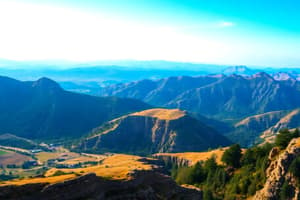Podcast
Questions and Answers
What does human geography primarily focus on?
What does human geography primarily focus on?
- Natural landscapes and ecosystems
- Human activities and their relationship with the environment (correct)
- Physical characteristics of Earth
- Geospatial technology and mapping tools
Which branch of geography involves the study of climate, vegetation, and landforms?
Which branch of geography involves the study of climate, vegetation, and landforms?
- Geospatial Technology
- Cultural Geography
- Human Geography
- Physical Geography (correct)
What is the main purpose of geospatial technology?
What is the main purpose of geospatial technology?
- Measuring population density
- Studying human behavior
- Mapping and analyzing spatial data (correct)
- Understanding historical events
Which of the following concepts explains the shared characteristics of an area?
Which of the following concepts explains the shared characteristics of an area?
What major trend in geography focuses on environmental conservation and development?
What major trend in geography focuses on environmental conservation and development?
What does Central Place Theory explain?
What does Central Place Theory explain?
Who emphasized the importance of environmental influences on human activities in geography?
Who emphasized the importance of environmental influences on human activities in geography?
Which tool is essential for visualizing spatial relationships in geography?
Which tool is essential for visualizing spatial relationships in geography?
Flashcards are hidden until you start studying
Study Notes
Definition of Geography
- Study of the Earth’s landscapes, environments, and the relationships between people and their environments.
- Examines spatial patterns and processes.
Branches of Geography
-
Physical Geography
- Focuses on the natural environment.
- Includes landforms, climate, vegetation, and ecosystems.
-
Human Geography
- Studies human activities and their relationship with the environment.
- Covers topics like culture, economy, urban development, and demographics.
-
Geospatial Technology
- Involves tools like GIS (Geographic Information Systems), GPS (Global Positioning System), and remote sensing.
- Used for mapping and analyzing spatial data.
Key Concepts in Geography
- Location: The position of something on the Earth's surface (absolute vs. relative).
- Place: Physical and human characteristics that define a location.
- Region: Areas defined by common characteristics (formal, functional, vernacular).
- Movement: The mobility of people, goods, and ideas across the planet.
- Human-Environment Interaction: How humans adapt to and modify their environment.
Importance of Geography
- Enhances understanding of global issues like climate change, urbanization, and globalization.
- Aids in planning and resource management.
- Informs policy-making and disaster management.
Tools and Techniques
- Maps: Essential for visualizing spatial relationships.
- Satellite Imagery: Provides data for environmental monitoring and urban planning.
- Field Studies: Involves gathering first-hand information about a location.
Current Trends in Geography
- Sustainability: Focus on sustainable development and environmental conservation.
- Globalization: Understanding interconnectedness and its impact on cultures and economies.
- Urbanization: Analyzing the growth of urban areas and their challenges.
Careers in Geography
- Urban planner
- Environmental consultant
- Geographic information systems (GIS) specialist
- Cartographer
- Climatologist
Major Theories in Geography
- Central Place Theory: Explains the size and distribution of human settlements.
- Location Theory: Examines the geographic location of economic activities.
- Environmental Determinism vs. Possibilism: Debates the influence of the environment on human actions.
Key Figures in Geography
- Carl Ritter: Emphasized the importance of environmental influences on human activities.
- Alexander von Humboldt: Known for his contributions to physical geography and biogeography.
- David Harvey: Influential in human geography, focusing on social justice and space.
Geographic Terminology
- Cartography: The science of map-making.
- Topography: The arrangement of natural and artificial physical features.
- Anthropogeography: Study of the relationship between human activity and the physical environment.
Definition of Geography
- Encompasses the study of Earth's landscapes and environments.
- Analyzes the interaction between humans and their environments.
- Investigates spatial patterns and processes occurring globally.
Branches of Geography
- Physical Geography:
- Examines natural elements like landforms, climate, vegetation, and ecosystems.
- Human Geography:
- Explores human activities, cultures, economies, urban development, and demographics in relation to the environment.
- Geospatial Technology:
- Utilizes tools such as GIS, GPS, and remote sensing for mapping and spatial data analysis.
Key Concepts in Geography
- Location: Differentiates between absolute (specific coordinates) and relative (comparison to other locations) positioning.
- Place: Describes unique physical and human characteristics that define specific locations.
- Region: Classifies areas based on shared traits, including formal, functional, and vernacular regions.
- Movement: Studies the transfer of people, goods, and ideas across distances.
- Human-Environment Interaction: Investigates how humans adapt to and modify their surroundings.
Importance of Geography
- Enhances comprehension of critical global issues such as climate change and urbanization.
- Facilitates effective planning and resource management strategies.
- Influences policy-making and improves disaster response mechanisms.
Tools and Techniques
- Maps: Fundamental for visualizing spatial relationships and geographical data.
- Satellite Imagery: Essential for environmental monitoring and urban planning initiatives.
- Field Studies: Involves direct collection of location-specific information.
Current Trends in Geography
- Sustainability: Emphasizes the need for sustainable development and conservation practices.
- Globalization: Analyzes the effects of increased interconnectedness on cultures and economic systems.
- Urbanization: Investigates the growth of urban areas and associated challenges.
Careers in Geography
- Urban planners strategize on land use and urban development.
- Environmental consultants advise organizations on environmental practices.
- GIS specialists manage and analyze geographical information.
- Cartographers create detailed and informative maps.
- Climatologists study climate patterns and their impacts.
Major Theories in Geography
- Central Place Theory: Investigates the size and distribution of urban settlements.
- Location Theory: Explains the geographic placement of economic activities and industries.
- Environmental Determinism vs. Possibilism: Analyzes the extent of environmental influence on human behavior and choices.
Key Figures in Geography
- Carl Ritter emphasized environmental factors in human activity.
- Alexander von Humboldt made significant contributions to physical geography and biogeography.
- David Harvey focused on the social justice implications in human geography.
Geographic Terminology
- Cartography: The art and science of creating maps.
- Topography: Describes the layout of natural and human-made features in a landscape.
- Anthropogeography: Examines the intersection of human activity and physical geography.
Studying That Suits You
Use AI to generate personalized quizzes and flashcards to suit your learning preferences.




